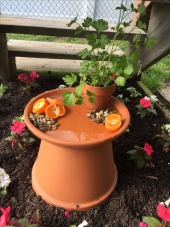posted 4 years ago
Hi Julia,
I second the suggestion to find out what chemicals your neighbor's are doing. Many won't stop, but a conversation with them about raising bees and the chemicals killing them, might possible result in them not spraying. Or at least maybe they would be willing to look at certain times of day or certain times of the year to affect the bees the least amount.
I don't know where you are, or how far you would have to go to get into an area that would have people gardening and farming on a larger scale than half an acre. Most farmers would love to have a bee hive or two (particularly since many pay to have bees brought in). There are also people like myself who understand the value of bees, have the land for bees, but are too scared of the little buggers to have any themselves. If someone stopped by and said they wanted to put a bee hive on my land, I would certainly consider it seriously. In this way, you own the bees, but they are just living somewhere else. Maybe depending on the crops and the time of year you might be able to move them around to follow the flowers. In the winter, I doubt they would go very far, especially if you left sugar water, so you might be able to overwinter them on your property.
"When the whole world is running towards a cliff, he who is running in the opposite direction appears to have lost his mind." C.S. Lewis
Visit https://themaineingredient.com for organic, premium dried culinary herbs that are grown, processed, and packaged in the USA.







